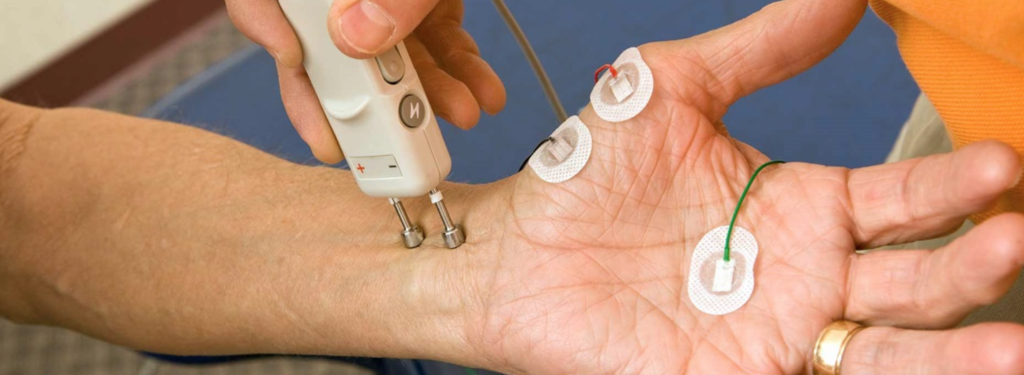NERVE CONDUCTION STUDY

What’s Nerve Conduction Study?
A Nerve Conduction Study (NCS), also known as Nerve Conduction Velocity (NCV) test, refers to a medical diagnostic test carried out to measure the speed of electrical impulses passing through a nerve. Neurologists usually recommend nerve conduction studies to assess nerve damage and dysfunction. This diagnostic test also helps determine the extent of a nerve injury. Nerve conduction studies usually involve stimulation of a nerve with the help of electrode patches attached to the skin to tell how quickly electrical signals move through the peripheral nerves.
What Conditions Do Nerve Conduction Studies Diagnose?
Nerve Conduction Studies aim to look for nerve damage and determine the extent of the damage. Neurologists also adopt this diagnostic test, together with an electromyography test, to show whether the nerve damage caused any harm to surrounding muscles. A nerve conduction study may occur to diagnose some muscular and neuromuscular disorders, including:
Guillain-Barré syndrome
Guillain-Barré syndrome refers to an autoimmune disorder that occurs when a person’s immune system attacks parts of the peripheral nervous system.
Herniated Disc Disease
Herniated disc disease refers to a condition that occurs when a part of the intervertebral disc nucleus pushes through a crack in the tougher exterior casing.
Chronic Demyelinating Polyneuropathy (CIDP)
Chronic demyelinating polyneuropathy (CIDP) refers to a neurological disorder that leads to swelling or inflammation of the nerve.
Myasthenia Gravis
Myasthenia gravis refers to a chronic autoimmune disorder that leads to weakness and rapid fatigue of skeletal muscles.
A neurologist may also recommend nerve conduction studies to diagnose other conditions including carpal tunnel syndrome, cubital tunnel syndrome, sciatica nerve problems, peripheral nerve injury, muscular dystrophy, muscular disorders, and pinched nerve syndrome.
How do Neurologists carry out Nerve Conduction Studies?
Before the commencement of the procedure, the patient will have to remove any metal object such as jewelry, hairpins, or glasses that may interfere with the procedure. The neurologist will locate the nerves and place two electrodes on the surface of the skin over the nerves. The electrodes will stick to the skin with the help of a jelly-type substance. One of these electrodes will serve to provide some form of stimulation to the nerves and the other will help record the stimulation.
This test typically takes 20 to 30 minutes to complete and may cause minor discomfort only during the procedure.
What’s the Possible Risks and Complications of Nerve Conduction Studies?
Similar to every other medical procedure, a nerve conduction study may occur with some minor complications. Possible complications associated with nerve conduction studies may include infection and continuous bleeding at the needle insertion site. Patients with pacemakers or cardiac defibrillators may undergo extra precautionary steps before and during the nerve conduction study.
What do the Results of a Nerve Conduction Study mean?
The stimulation and nerve response records will show up on a monitor for the neurologist to assess. A nerve conduction study result between 50 and 60 meters per second remains the range for a healthy nerve, while a damaged nerve may send weaker or slower signals. Depending on the age, sex of the patient, and environmental factors, the neurologist will determine the health status of the nerve.
References
Chouhan S. (2016). Normal motor and sensory nerve conduction velocity of radial nerve
in young adult medical students.
ncbi.nlm.nih.gov/pmc/articles/PMC4740585/
Owolabi, LF, et al. (2016). Median nerve conduction in healthy Nigerians: Normative data.
ncbi.nlm.nih.gov/pmc/articles/PMC4866372/
Hinkle J, Cheever K. Brunner & Suddarth’s Handbook of Laboratory and Diagnostic Tests. 2nd Ed, Kindle. Philadelphia: Wolters Kluwer Health, Lippincott Williams & Wilkins; c2014. Electromyography; p. 250–251.
Merck Manual Consumer Version [Internet]. Kenilworth (NJ): Merck & Co. Inc.; c2019. Quick Facts: Electromyography (EMG) and Nerve Conduction Studies
UW Health [Internet]. Madison (WI):University of Wisconsin Hospitals and Clinics Authority; c2021. Electromyogram (EMG) and Nerve Conduction Studies
